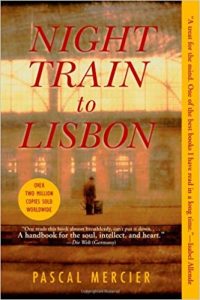Learning from Fiction: Anger Management in the Novel NIGHT TRAIN TO LISBON

Pascal Mercier’s Night Train to Lisbon is a fascinating literary novel and also a treasure of quotable wisdom. On the walk to work a Bern schoolteacher experiences a life-changing moment when he saves a woman from jumping off a bridge into the river. If he doesn’t become haunted by the woman herself, he becomes haunted by her language and, after a ride on the night train to Lisbon, her country. In a secondhand bookstore he buys a little-read memoir and begins an excursion into the life of a physician who grew up devoted to his father yet in conflict about the fact that his father was a judge under the dictator Salazar. The passage on anger that so struck me, being someone who has spent a lifetime feeling that his temper is his worst enemy, comes from the fictional memoir within the novel.
“When others make us angry at them…they exercise power over us…a white-hot poison that corrodes all…balanced feelings and robs us of sleep. Sleepless, we turn on the light and are angry at the anger that has lodged like a succubus who sucks us dry and debilitates us. We are not only furious at the damage, but also that it develops in us all by itself, for while we sit on the edge of the bed with aching temples, the distant catalyst remains untouched by the corrosive force of the anger that eats at us. On the empty internal stage bathed in the harsh light of mute rage, we perform all by ourselves a drama with shadow figures and shadow words we hurl against enemies in helpless rage we feel as icy blazing fire in our bowels. And the greater our despair that it is only a shadow play and not a real discussion with the possibility of hurting the other and producing a balance of suffering, the wilder the poisonous shadows dance and haunt us even in the darkest catacombs of our dreams. (We will turn the tables, we think grimly, and all night long forge words that will produce in the other the effect of a fire bomb so that now he will be the one with the flames of indignation raging inside while we, soothed by schadenfreude, will drink our coffee in cheerful calm.) What could it mean to deal appropriately with anger? We really don’t want to be soulless creatures who remain thoroughly indifferent to what they come across, creatures whose appraisals consist only of cool, anemic judgments and nothing can shake them up because nothing really bothers them. Therefore, we can’t seriously wish not to know the experience of anger and instead persist in an equanimity that wouldn’t be distinguished from tedious insensibility. Anger also teaches us something about who we are. Therefore this is what I’d like to know: What can it mean to train ourselves in anger and imagine that we take advantage of its knowledge without being addicted to its poison? We can be sure that we will hold on to the deathbed as part of the last balance sheet—and this part will taste bitter as cyanide—that we have wasted too much, much too much strength and time on getting angry and getting even with others in a helpless shadow theater, which only we, who suffered impotently, knew anything about. What can we do to improve this balance sheet? Why did our parents, teachers and other instructors never talk to us about it? Why didn’t they tell something of this enormous significance? Not give us in this case any compass that could have helped us avoid wasting our soul on useless, self-destructive anger?”
Gary Garth McCann
First-prize winner for short works and for suspense/mystery, Maryland Writers’ Association, Gary Garth McCann is the author of the novella Young and in Love? and of the novels The Shape of the Earth and The Man Who Asked To Be Killed, praised at the Washington Independent Review of Books. His most recent published stories are available online in Chelsea Station Magazine, Erotic Review Magazine, and in Mobius: The Journal of Social Change. His other stories appear in The Q Review, reprinted in Off the Rocks, in Best Gay Love Stories 2005, and in the Harrington Gay Men’s Fiction Quarterly. See his blogs at garygarthmccann.com and streamlinermemories.com.
- Web |
- More Posts(57)